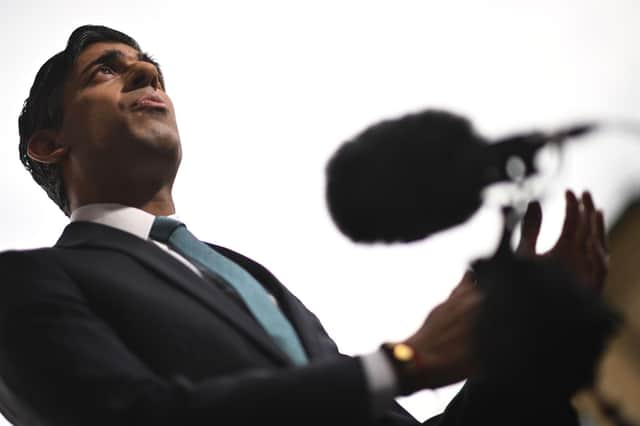Owen Polley: Northern Ireland Protocol deal is likely to leave unionists disappointed


Almost all the briefings to journalists so far, from sources in London and Brussels, focus on green and red ‘lanes’ for goods arriving in Northern Ireland, fewer physical checks and a lower profile role for the European Court of Justice (ECJ).
Unless the two sides deliver a surprise, the deal is unlikely to put British rules on a par with single market regulations, or do away completely with extra paperwork for GB companies selling to NI.
Advertisement
Hide AdAdvertisement
Hide AdOn Wednesday, the Daily Telegraph reported that, “The government is suspected of caving over its Protocol demands that businesses in Northern Ireland be allowed to choose whether to follow UK or EU standards.” The newspaper even highlighted new rules aimed at Chinese goods that will soon apply to GB companies selling to NI.
We will probably, in effect, remain cut off from the rest of the UK’s economy, with a trade border persisting down the Irish Sea and vast swathes of life still governed by unaccountable EU officials.
However it’s presented, that would represent a defeat for this prime minister, to rank with the self-destructive agreements signed by Theresa May and Boris Johnson
Rishi Sunak and his government will have failed to honour repeated promises to sort out the sea border through negotiation, or act unilaterally by legislating in parliament. They will have dropped much of the content of the Northern Ireland Protocol Bill, which is no longer expected to proceed through the House of Lords.
Advertisement
Hide AdAdvertisement
Hide AdThat means this province will never be included fully in Brexit, as it is understood in most of the UK. And, if Great Britain diverges steadily from the EU, our economic and political role in this nation state will become unrecognisable to the rest of the country. We will be, effectively, a different class of British citizens.
The government will deny this of course. It claims that its deal will meet the ‘seven tests’ drafted by the DUP to judge whether any solution is acceptable. Indeed, after his meeting with Sunak, Jeffrey Donaldson was reasonably up-beat about the ‘progress’ made in the negotiations.
In classic DUP-style, though, its seven tests were always rather ambiguous.
It should be quite simple to judge whether any agreement solves the problems with the protocol.
Advertisement
Hide AdAdvertisement
Hide AdIf businesses in England face more checks or paperwork to sell goods in Northern Ireland than they need to make the same sale to Scotland, we have not been restored fully to the UK internal market. If products have to adhere to single market regulations rather than British rules to be sold here, the same is true. And if we are subjected to EU laws or the jurisdiction of the ECJ, in a way that the rest of the country is not, then our place in the Union has not been repaired.
If we judge a deal by those three tests, we will have absolute clarity on our position, without any discussions about whether there really is a ‘border in the Irish Sea’, or whether a regulatory border with the rest of the UK is new or existing (the DUP tests only rule out new barriers).
That’s before we get into a philosophical debate about whether a deal abides by “the letter and spirit of NI’s constitutional guarantee in the Belfast Agreement”.
Ironically, the best chance of Northern Ireland avoiding drifting ever further from the rest of the UK may now hang on Rishi Sunak letting down another group whose support he previously courted.
Advertisement
Hide AdAdvertisement
Hide AdThere is mounting evidence that the prime minister intends to realign the whole UK with the EU, and the NI Protocol deal could be just the first step.
According to reports, Rishi Sunak has asked senior ministers and officials to rebuild Britain’s links with Brussels. The Daily Express claimed that the proposals would focus on “defence, migration and economic statecraft,” which includes things like “trade, energy and economic standards”.
That description could cover most of the content of the protocol. It would put Sunak in the same political territory as his Labour rival, Keir Starmer, who is open about his desire to move closer to Brussels, if he becomes the next PM.
Many commentators are convinced that the UK will sign up again quietly to many aspects of the European Union, without officially reneging on Brexit for the time being. One of the most prominent politicians on the Leave side, Michael Gove, was involved in an event with senior bank executives recently that focussed on forging a closer relationship with Brussels.
Advertisement
Hide AdAdvertisement
Hide AdThere were always valid arguments to leave the EU on terms that kept the UK aligned closely with the bloc. Unfortunately, the politicians who favoured that type of arrangement, particularly in the Conservative party, often hid their intentions, rather than arguing their case honestly and on its merits.
Theresa May, to take the most notorious example, planned to use her backstop as an excuse for the whole UK to remain close to Brussels’ single market and customs union.
If Rishi Sunak has similar intentions, he should debate them openly with his Conservative colleagues, rather than making a deal on Northern Ireland that allows the Union to be weakened gradually and creates further resentment at Westminster.